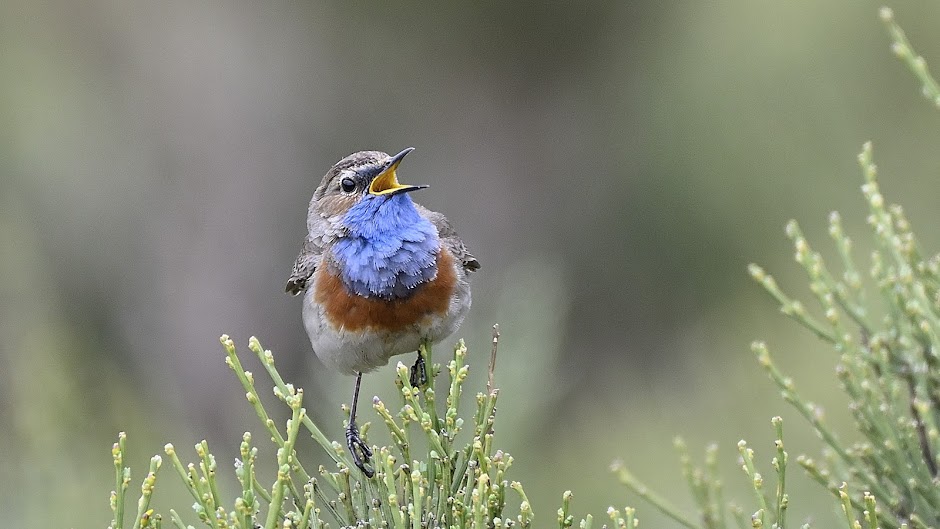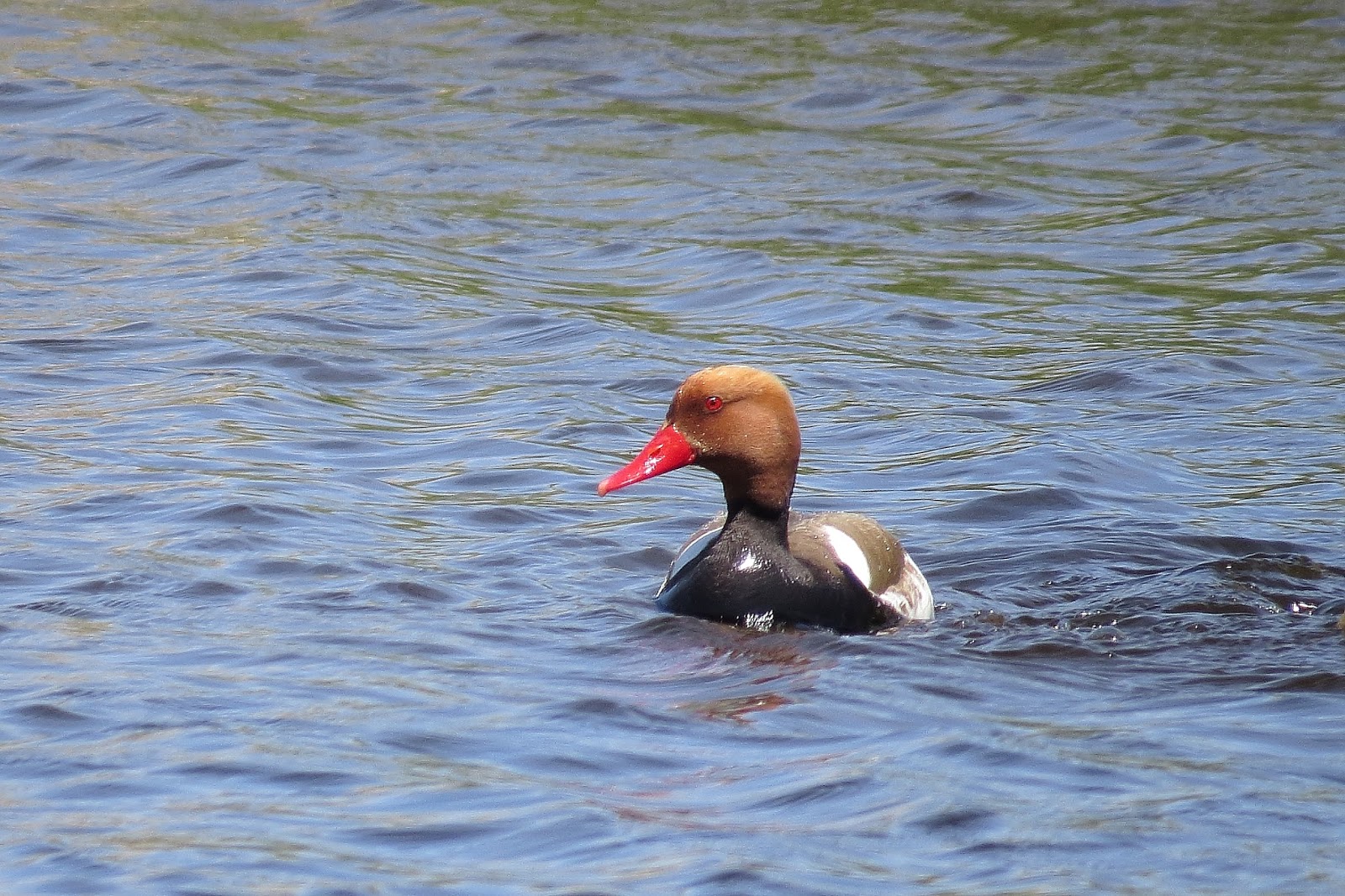A finales del mes de abril me contrataron para ir al Parque Nacional Tablas de Dainiel. Aprovechando que no estaba muy lejos decidí pasarme primero por la Reserva Natural de las Tablas de Malagón y acceder a Daimiel por su zona suroeste para finalizar en la Laguna de Navaseca.
In late April I was hired to go to Tablas de Dainiel National Park. Taking advantage that it was not too far I decided to start by Las Tablas de Malagon Nature Reserve and access Daimiel by its southwestern part and ending the trip at Navaseca Lagoon.
Tuvimos mucha suerte con el tiempo pues fue estupendo y también con el día de pajareo que fue mejor. Vimos gran cantidad de especies durante toda la jornada y algunas de ellas eran las primeras de la temporada que acababan de llegar lo que dio un valor añadido a la excursión.
We were very lucky with the weather that was great and better was the day of birding. We saw many species throughout the day and some of them were the first of the season that had just arrived which gave added value to the tour.
Reserva Natural Tablas de Malagón:
Tablas de Malagón Natural Reserve:
Estas lagunas estaban bien de agua pero la vegetación palustre y la falta de observatorios hacían casi imposible ver todas las aves que en este lugar se concentran. En la foto un chorlitejo chico (Charadrius
dubius).
These lagoons have enough water but the marsh vegetation and lack of observatories made it almost impossible to see all the birds that concentrate in this place. In the picture a Little Ringed Plover.
Lo más abundante eran los fumareles cariblancos (Chlidonias
hybridus).
The most abundant were the Whiskered Terns.
Y también vimos un par de correlimos comunes (Calidris alpina).
And we also saw a couple of Dunlins.
Había varias parejas de cigüeñuelas comunes (Himantopus
himantopus).
There were several pairs of Black-winged
Stilt.
Y no faltaban los trigueros (Miliaria
calandra).
And there were plenty of Corn
Buntings.
Después de un buen rato pusimos rumbo al Parque Nacional de las Tablas de Daimiel.
After a while we headed to Tablas de Daimiel National Park.
En el camino vimos una pareja de las bellas carracas europeas (Coracias
garrulus).
On the way we saw a couple of the beautiful European
Rollers.
Parque Nacional Tablas de Daimiel:
Tablas de Daimiel National Park:
Y llegando ya al Parque vimos esta pareja de ánsares comunes (Anser
anser).
And arriving to the park we saw this pair of Greylag Geese.
Lo primero que visitamos fue la laguna de aclimatación. En la foto un macho de cuchara común (Anas
clypeata).
The first we visited was the Laguna de aclimatación. In the photo a male of Northern
Shoveler.
Cercetas pardillas (Marmaronetta
angustirostris).
Marbled
Ducks.
Había dos ejemplares que estaban volando por encima de la red de la laguna y como se puede ver están anilladas. Debe tratarse de ejemplares liberados de las nacidas en éste lugar.
There were two that were flying over the net of the lagoon and as you can see they are ringed. They should be release stock of those born in this place.
Un macho de silbón europeo (Anas
penelope).
A male of European wigeon.
Precioso macho de cerceta carretona (Anas querquedula).
Pretty male of Garganey.
Macho de porrón pardo (Aythya
nyroca).
Ferruginous
Duck male.
Macho de porrón moñudo (Aythya
fuligula).
Tufted
Duck male.
Pato colorado macho (Netta
rufina).
Red-crested
Pochard male.
Cabeza de un macho de tarro blanco (Tadorna
tadorna).
Head of a male of Common
Shelduck.
Macho de malvasía cabeciblanca (Oxyura
leucocephala).
White-headed
Duck male.
Hembra de malvasía cabeciblanca (Oxyura leucocephala).
White-headed Duck female.
En cuanto salimos de la laguna de aclimatación pudimos ver varias garzas imperiales (Ardea
purpurea).
As we left the laguna de aclimatación we could see several purple herons.
Y algunas menos garzas reales (Ardea
cinerea).
And some less Gray Herons.
Una pareja muy confiada de ánades reales (Anas
platyrhynchos). El macho.
A very trusting couple of Mallards. The male.
Y la hembra.
And the female.
Este somormujo lavanco (Podiceps
cristatus) tardo un rato en poder tragar el pez que había capturado.
This Great Crested Grebe tooks a while to be able to swallow the fish he had caught.
Y también se veían algunos patos colorados (Netta rufina).
And some Red-crested Pochard were also seen.
Había algunos fumareles cariblancos (Chlidonias hybridus).
There were some Whiskered Terns.
Y toda una pena que esta garcilla cangrejera (Ardeola
ralloides) fuese más rápida que mi reacción en fotografiarla. Primero la habíamos visto desde uno de los observatorios y luego se fue y nos pasó muy cerca nuestro.
And a pity that this Squacco Heron was faster than my reaction to photograph it. First we had seen it from one of the observatories and then it left and passed very close to us.
Se oían algunos carriceros tordales (Acrocephalus arundinaceus) pero era difícil encontrarles.
Some Great Reed Warblers were heard but it was hard to find them.
Y lo mismo ocurría con los carriceros comunes (Acrocephalus scirpaceus).
And the same happened with the Reed
Warblers.
Había bastante trasiego de garcillas bueyeras (Bubulcus
ibis).
There was quite movement of Cattle Egrets.
En alguno de los observatorios estaban construyendo su nido las golondrinas comunes (Hirundo
rustica).
In some of the observatories the Barn Swallows were building their nests.
Se podían observar bastantes somormujos lavancos (Podiceps cristatus).
You could see a lot of Great Crested Grebes.
Y fochas comunes (Fulica
atra).
And Common Coots.
Macho de porrón europeo (Aythya
ferina).
Common
Pochard male.
Y en esta una hembra.
And here a female.
También pudimos observar varias parejas de tarabillas comunes (Saxicola rubicola). En la foto un macho.
We also saw several pairs of Common
Stonechats. In the photo a male.
Y en esta su compañera.
And in this its mate.
Esta garceta grande (Egretta
alba) estaba con su plumaje nupcial.
This Great Egret was with its breeding plumage.
Precioso animal que tuvo la amabilidad de salir de su escondite para que la pudiésemos ver en todo su esplendor.
Beautiful animal that was kind enough to come out of its hid so that we could see in all its glory.
Este triguero (Miliaria calandra) estaba tan confiado que pudimos acercarnos a él a tan solo unos pocos metros.
This Corn Bunting was very tame so we could approach him very close.
Fue una pena que esta hembra de bigotudo (Panurus
biarmicus) estuviera tan lejos de donde estábamos.
It was a shame that this female of Bearded
Tit was so far from where we were.
Un macho de pájaro moscón (Remiz
pendulinus).
A male of Penduline Tit.
Esta fue la única lavandera boyera (Motacilla
flava) que vimos.
This was the only Yellow Wagtail we saw.
Y cuando ya regresábamos a la furgoneta para continuar con la excursión vimos a este ánsar común (Anser anser).
And when we were returning to the van to continue with the tour we saw this greylag goose.
A la salida del Parque vimos a este hermoso martinete común (Nycticorax
nycticorax).
Upon leaving the Park we saw this beautiful Night Heron.
Laguna de Navaseca:
Navaseca Lagoon:
De todo el recorrido lo más entretenido fue la Laguna de Navaseca. En la foto un chorlitejo grande (Charadrius
hiaticula).
The most entertaining of the journey was Navaseca Lagoon. The photo shows a Great Ringed Plover.
Otro más.
Another one.
También había algunos andarríos chicos (Actitis
hypoleucos).
There were also some Common
Sandpipers.
Y bastantes avocetas comunes (Recurvirostra
avosetta) aunque bastante alejadas de la zona donde se podía fotografiar a las aves.
And quite a few Avocets but too far from the area where we could photograph birds.
El causante de su lejanía era este macho de chorlitejo patinegro (Charadrius
alexandrinus) que expulsaba a quien osase acercarse a su nido y en especial a las avocetas (Recurvirostra avosetta).
The causing of this remoteness was a male of Kentish Plover which was expelling who dared to approach his nest especially to the avocets.
Tan pequeño y tan malhumorado.
So small and so bad tempered.
Al final no fue difícil ver a su hembra en el nido.
In the end it was not difficult to see his female in the nest.
También había algunos combatientes (Philomachus
pugnax).
There was also some Ruffs.
Y entre ellos un archibebe común (Tringa
totanus).
And among them a Common
Redshank.
Otro hermoso archibebe común (Tringa totanus).
Another beautiful Common Redshank.
Había muchas malvasías cabeciblancas (Oxyura
leucocephala). En la foto dos machos.
There were many White-headed
Ducks. In the photo two males.
Y dos grupos de flamencos comunes (Phoenicopterus
ruber).
And two groups of Greater
Flamingos.
Una golondrina común (Hirundo rustica).
A Barn Swallow.
Zampullín común (Tachybaptus
ruficollis).
Little
Grebe.
Estos dos pollos de ánade real (Anas
platyrhynchos) estaban muy asustados y solos.
These two ducklings of Mallard were very frightened and alone.
También había algunas garcillas bueyeras (Bubulcus
ibis).
There were also some Cattle Egrets.
Un macho de ánade friso (Anas
strepera).
A male of Gadwall.
Y había tres parejas de ánsares comunes (Anser
anser) con pollos.
And there were three Greylag Geese couples with goslings.
Zampullín cuellinegro (Podiceps
nigricollis).
Black-necked
Grebe.
Había varias colonias de cría de gaviotas reidoras (Chroicocephalus
ridibundus).
There were several breeding colonies of Black-headed
Gulls.
Gallinetas comunes (Gallinula
chloropus).
Moorhens.
Y muchas fochas comunes (Fulica
atra).
And many Coots.
Y ya tarde comenzaron a llegar bastantes canasteras comunes (Glareola
pratincola).
And later in the afternoon began to arrive quite a few Collared Pratincoles.
Bonitas aves.
Beautiful birds.
Las cigüeñuelas comunes (Himantopus
himantopus) nos entretuvieron bastante tiempo.
Black-winged
Stilts entertained us quite a while.
Y para terminar os dejo con esta imagen de uno de los muchos fumareles cariblancos (Chlidonias
hybridus) que había en esta Laguna.
And to end I leave you with this image of one of the many Whiskered Terns that were in this Lagoon.
Hasta pronto.
Bye bye.







































































































No hay comentarios:
Publicar un comentario